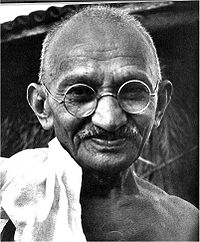Professionalizing the Indian political scene?
 Friday, July 16, 2010 at 12:05AM
Friday, July 16, 2010 at 12:05AM WAPO story on parliamentary bill in India to raise salaries of members, a contentious subject anywhere in the world but more so in India, due to the Gandhi ideal.
Politicians have an image problem in the world's largest democracy. They are blamed for everything -- airline crashes, poverty, terrorism, hunger, cricket scandals. They are lampooned in movies, stand-up comic routines and street plays. In opinion polls, they often rank lowest as youth icons and highest as those viewed most corrupt.
Many Indians cling to the image of a frugal and bare-chested Mahatma Gandhi as the epitome of a politician, even as the burgeoning middle class experiences new wealth and conspicuous consumption.
So when a committee of federal lawmakers submitted a proposal last month seeking a fivefold pay increase, people were shocked. They bashed the idea in tweets, around the dinner table and on TV. Some even praised the British, whose members of Parliament recently decided to trim their salaries in these uncertain economic times.
Indian lawmakers currently take home about $372 a month, an amount most say is embarrassingly low. If the raise goes through, they would make about $1,860 a month -- a little less than the average IT graduate makes fresh out of college in the big city.
"We cannot forever be stuck in Gandhi's image from the freedom movement. In comparison, people think we are all corrupt crooks looting the nation," said Sanjay Nirupam, a Congress Party lawmaker from Mumbai, who wrote a recent op-ed in the Indian Express newspaper arguing for a raise.
Nirupam calls himself a "professional politician," a near-blasphemous term in India.
"My expenses are enormous. About 200 people come to see me every day. I have to offer them all at least a cup of tea, or they will abuse me and call me a miserly politician," Nirupam said. "Most of Mumbai's politicians own beer bars to supplement their incomes."
But in a country where about 300 million people earn less than $1 a day, the thought of a politician enjoying a meal in a five-star hotel or traveling in luxury cars still rankles the masses.
Independent studies show that parliamentary members tend to see their incomes rise substantially once in office, but it ain't because of their salaries, so one side of the argument says you need to pay them better to make them less dependent on lobbyists, etc.
"There is a lot of hypocrisy among Indians. They want young professionals to enter politics, but do not want them to be paid well," said M.R. Madhavan, head of research at the PRS Legislative Research, a group that tracks parliamentary practices.
But not all members of Parliament want more money.
Lawmakers from Communist parties, many of whom live in modest apartments and often carpool to work, told the prime minister that they do not want a big raise.
"The idea of leaders giving themselves a raise is inappropriate. There should be an independent body to decide this," said D. Raja, a lawmaker from the Communist Party of India. "The raise should not appear to be exorbitant in the present economic conditions. Only then people will understand."
Sounds like reasonable advice.
Every country on the rise faces this moment: when you need to make politics a more honorable and worthy profession. When Teddy Roosevelt told his rich family that he planned to go into politics, they were aghast at the potential family shame. Politics was then considered such a low and corrupt business, a situation that resurfaced with the Boomer era.
Why? Just like back in the late 19th century, this is an era of expanding business empires and rapid frontier integration--just on a global scale this time. So the most "worthy" career tracks are to be found in those realms, not politics.
But as we enter into a period of great consolidation, when all that natural populist anger must be channeled into useful political progressivism, that's got to change. And it's got to change especially in rising pillars like India.
All this expansion of globalization means we head into an era of many new rules, and making those rules happen has to be considered an honorable profession.










Reader Comments